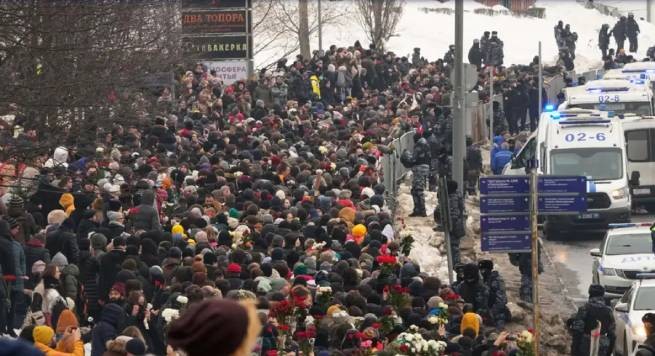Thousands of people saw off Alexei Navalny, the Russian opposition leader who died in the Polar Wolf colony in Kharp, on his final journey on March 1.
Despite threats of detention, they came to say goodbye to him at the church where his funeral service was held, and at the Borisov cemetery in the capital, where the politician was buried.
On the eve of the funeral ceremony for Alexei Navalny, his relatives were unable to find a hall for farewell – all the funeral companies they contacted refused their services when the name of the oppositionist was mentioned, tells D.W. At the last moment, one of them agreed to provide a hearse, which took Navalny’s body to the Church of the Icon of the Mother of God “Quiet My Sorrows.” Not far from it is Lyublinskaya Street, where Navalny lived in Moscow. Those who came chanted the name of the oppositionist, and in the crowd they discussed “who killed Navalny?”
Thousands of Russians flocked to the church from the very morning, and the queue stretched for several kilometers. They raised flowers above their heads, sometimes shouting “Navalny!” More than ten years ago, the same thing could be heard on the streets of Moscow, when Alexei Navalny waged an active political struggle – he ran for the post of mayor of Moscow, and then led a presidential campaign in 2018.
The authorities decided not to carry out mass arrests during the funeral ceremony, although they announced that they would consider those who came to the funeral to be participants in an “unauthorized meeting.” “Those who participate in them will be held accountable,” assured the press secretary of the Russian President Dmitry Peskov.
However, on the day of the funeral, it became known that six people were detained in Moscow. In the Russian regions – in Yekaterinburg, Voronezh and Novosibirsk – security forces detained at least 45 people, some of whom participated in laying flowers at monuments to political prisoners – spontaneous memorials appeared there in memory of Alexei Navalny. Many of those detained were soon released from police departments “with a warning.”
Internet access was limited at the farewell ceremony. Only a few dozen people were allowed into the church for the funeral ceremony, including Navalny’s mother and father. The area was cordoned off – a line of police officers stretched along metal fences placed the day before from the nearest metro station. Problems with Internet access did not allow journalists to conduct high-quality video broadcasts.
Neither Yulia Navalnaya nor her children, who did not come to Russia for security reasons, were present at the funeral service. Two days earlier, Julia spoke in the European Parliament. She promised to avenge her husband’s death. On her Instagram she wrote: “Lyosha, thank you for 26 years of absolute happiness.”
The crowd showered the hearse with flowers as the politician’s coffin was placed inside. Some people knocked down the fence when the police left them and followed the car towards the Borisov cemetery. On the street, the crowd continued to chant the name of the deceased oppositionist, and the slogans were added: “No to war!”, “Love is stronger than fear.”
The coffin with the body of Alexei Navalny was lowered into the grave to the song of Frank Sinatra “May way” and the soundtrack from “Terminator 2”. By this time, a long line had formed at the entrance to the cemetery – many wanted to personally throw a handful of earth to express gratitude to the politician. People continued to be allowed to visit Navalny’s grave for several hours after the cemetery was officially closed.
Some Russian politicians, ambassadors of the United States and European Union countries paid tribute to the memory of the leader of the Russian opposition. The flowers were brought by the former mayor of Yekaterinburg, Yevgeny Roizman: he called Navalny an Orthodox “martyr who was tortured” and wished that the deceased oppositionist would be recognized as a canonical saint in the future. “He has much more grounds for this than Nicholas II: Navalny did not send people to their deaths, did not spend people’s money,” Roizman said.
Boris Nadezhdin and Ekaterina Duntsova, who were not allowed to participate in the Russian presidential elections in 2024, came to the funeral. “He will never see spring again, because here, where he left, he got winter and the permafrost of the Arctic, and where he goes, there will be only eternal summer,” Duntsova wrote in her Telegram channel. She added that the memory of Navalny “will remain in history.”
In a conversation with DW, Nadezhdin called Navalny’s death a tragedy, emphasizing that his name continues to be “symbolic” for millions of Russians: “Look at the line that lined up to say goodbye to him.” Nadezhdin said that he knew Alexei Navalny at the dawn of his political career – the aspiring oppositionist was responsible for the advertising campaign of the Union of Right Forces party and was a member of the Yabloko party.
Navalny’s grave:







More Stories
The 33rd Olympic Games opened in Paris (updated)
FT: "consumer boom in Russia"
Massive attack on French rail network on opening day of Olympics